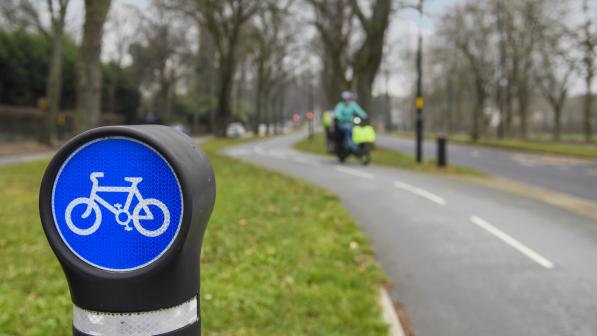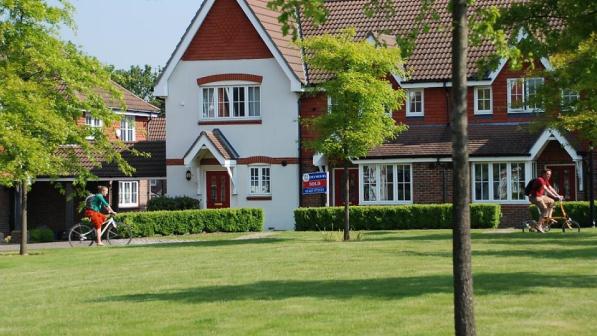Message to Parliament: we need Pedal-Powered Planning now!

Michael Gove MP is now into his second stint as Communities Secretary, responsible for ‘levelling up’, local government, housing and planning. On both occasions, though, his first job was to diffuse the political flames engulfing the planning policies put forward by his predecessor.
When he was first given the role by Boris Johnson, he inherited the planning reforms developed by the previous Communities Secretary Robert Jenrick. These had become politically toxic with Conservative backbenchers from home-counties and red-wall constituencies alike.
They also prompted the formation of the Better Planning Coalition (BPC), of which Cycling UK is a member, along with more than 30 organisations united by common a goal to seek “a planning system that is fit for the climate, nature and people”.
His Levelling Up and Regeneration Bill (LURB), though hugely problematic, dropped Jenrick’s most controversial proposals. However, having launched LURB in Parliament, he was then cast out into back-bench exile for several months.
Meanwhile Liz Truss’s administration belatedly proposed amendments to LURB – and even potentially a whole new Planning and Infrastructure Bill – that would have unleashed a planning free-for-all, in the name of economic growth. It amounted to an ‘attack on nature’ that could have seen a revival of fracking even in our National Parks.
The Better Planning Coalition was getting onto a war footing – as were& the Conservative backbench rebels.
By the time Rishi Sunak reappointed Gove to his former role, his Bill was coming up for& its final Commons debate. Westminster pundits were predicting political fireworks, with revolts expected both over housing targets and the Government’s previous virtual ban on onshore wind. The fact that neither revolt materialised is testament, once again, to Gove’s remarkable abilities as a political operator.
Yet that doesn’t meant that all is well with his planning legislation and policies.
Problems persist
While LURB was passing through the Commons, the BPC put forward a wide range of amendments, covering social housing, green building standards, protection of nature and democratic participation in the planning process itself.
The amendments most relevant to Cycling UK and our allies in the Walking and Cycling Alliance (WACA, most of whom are also members of BPC) were those seeking to embed climate, health and wellbeing (including access to nature) as considerations in national and local planning policy, and in decisions on the granting or refusal of planning permission for housing and other developments.
We want to ensure that the location of new developments, as well as the design and layouts of their transport, road and path networks, support clean and healthy travel, rather than entrenching car dependence. As our friends at Transport for New Homes have shown, car-dependent housing has been all too prevalent now for several decades.
WACA also put forward an amendment (also supported by BPC) that would require proposed walking, cycling and rights-of-way network plans to be recorded in local planning authorities’ development plans. Development plans determine what types of development will or will not be granted planning permission, and in what locations.
Getting walking, cycling and rights-of-way networks written into these would protect land (such as disused railway lines) from being built on where this would obstruct potentially useful walking and cycling routes, while helping to secure funding from developers to fund new or improved walking and cycling routes.
Yet, despite the efforts of more than 1,500 Cycling UK members and supporters who responded to our Pedal-Powered Planning campaign – a massive thank-you to all of you! – the Government shrugged off WACA’s proposals, and indeed everything else put forward by BPC and its member organisations.
However, that’s not a reason to be disheartened. It’s normal for governments to shrug off everyone else’s proposed amendments to Bills in the Commons, only to make concessions in the Lords, where they don’t have a built-in majority. If you’re going to get a Bill amended, the place where you win is usually the Lords.
Government agrees, but not just yet…
We have however suffered one setback. The way the Government brushed aside our amendments in the Commons was to argue (as it often does) that our proposals would be better addressed through policy than through legislation. In this case, they promised that they would soon be publishing a new draft National Planning Policy Framework (NPPF) for consultation – and this would address all our concerns about the Bill.
Then, as soon as the Commons had passed the Bill, the Government published its consultation on revising the NPPF, including some minor revisions to the NPPF itself, plus some proposals to make further amendments to the NPPF at a future date (see Chapter 12 of the so-called ‘NPPF Prospectus’).
Guess what? The things that WACA and the BPC are most concerned about – the climate, nature, health and wellbeing, and specifically the promotion of sustainable transport – had all been kicked into the long grass of these future NPPF amendments. And guess what else? Those future amendments won’t be published until LURB has been passed by the Lords as well as the Commons.
Ministers are effectively saying that they will address our concerns over their legislation through planning policies – but these won’t be published till after Parliament has passed the legislation!
Topsy-turvy priorities
The tantalisingly good news is that the new draft NPPF does acknowledge the issue that 2,000 of you contacted your MPs about. Chapter 12 of the Prospectus acknowledges that one area of planning policy that “may require updating” is the need for “better environmental and health outcomes [and] delivering appropriate infrastructure (including sustainable transport provision”.
It adds that the Government “proposes to assess what changes are needed to reflect the government commitment to encourage active travel through the ‘Gear Change’ programme … and wider work to reduce carbon consumption from transport planning choices as set out in the Transport Decarbonisation Plan”.
However, it makes no sense to kick this issue into the long grass, while giving far greater urgency to ensuring that new developments are ‘beautiful’. It makes sense to stipulate that new developments should be beautiful – nobody would disagree with that.
But if you compare the NPPF’s policy mandating local authorities to reject developments that are not “beautiful” (paragraph 134) with the corresponding policy in the sustainable transport chapter (paragraph 111), it is clear that the latter will still make it really difficult for councils to reject developments that would generate a lot of extra car traffic.
This is completely topsy turvy. As I’ve said before, a beautiful development in an unsustainable location is still an unsustainable development. Councils should therefore be given a clear mandate to reject car-dependent developments, just like paragraph 134 tells them to reject developments that are not beautiful.
Given that we are in a climate and ecological crisis, this really needs to be done urgently, not at some time in the distant future.
Urging Peers to back Pedal-Powered Planning next Tuesday!
The Lords will now get their first opportunity to debate LURB next Tuesday (17 January). We and our allies in WACA have produced a Lords briefing. The good news is that we have been speaking with several Peers from across the political spectrum, who are keen to support what we are calling for – namely that the Government should:
- Embed policies on climate, health and nature (including access to nature) as key considerations at all stages in the planning system: from national and local policy, through to specific local planning decisions
- Require local planning policies to support the creation of ‘20-minute neighbourhoods’, where residents can access key facilities (schools, healthcare, public transport and so on) within a short walk or cycle of their homes
- Require the Development Plans adopted by local planning authorities to include any plans for cycling and walking networks and any rights of way improvement plans drawn up by the relevant local transport or highway authorities. This would prevent planning permission being granted for buildings that would obstruct disused railway lines or other potentially useful cycling and walking routes, while helping to secure funding from developers to introduce or upgrade such routes
- Amend the National Planning Policy Framework to give local planning authorities a clear mandate to reject car-dependent developments
In short, though, we need pedal-powered planning now, not at some distant point in the future! We hope the Government heeds our call.




